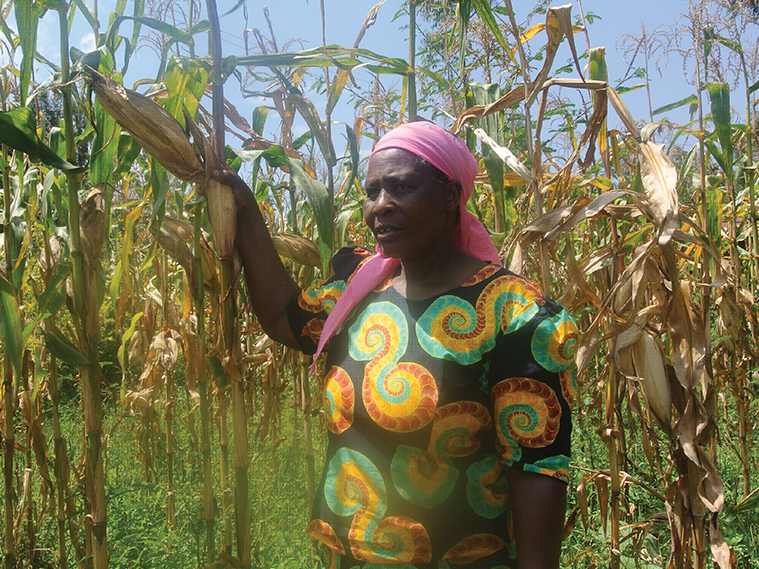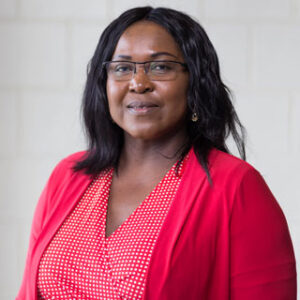By Evelyn Situma
Looking at the failed crops around her neighbours’ farms in Eliang’oma village in Vihiga County, 50-year old Jane Sabula is grateful for the decision she took two years ago to start planting DroughtTEGO® hybrid maize on her farm.
At her local church, most of the stories from her fellow women are about crop failure, and the difficult choices their families have to make between buying maize flour and sending their children to school.
In Vihiga as in the rest of Kenya’s Western region, maize is by far the staple food crop, but in the past year, both long and short rainy seasons brought far less rain than usual, resulting in depressed maize harvests. As stocks fell, the price of maize flour rose by almost double, from KSh.90 for a packet of maize flour.
“I am not sure if it’s this soil that has favoured your seed over other maize varieties, because there is no time I ever harvested more than two bags of maize (a bag is 90 kg) from my one-acre farm (equivalent of 0.2 ha; i.e. yield of 0.9 tons/ha). I thank God that as soon as I planted your maize seed I have not suffered hunger, even when my neighbours complained of maize shortage,” she says.

For the first few months of 2017, Kenya grappled with maize shortage due to drought. The scarcity of the product saw the price of a 2kg packet of flour retail at between KES150 and 180 up from KES90. Public outcry caused the government to import 8 million bags (equivalent of 720,000metric tonnes) of white maize at KES 6 billion and subsidized the flour at a retail price of KES90.
But Jane was among the lucky ones. “I have been fortunate because I was able to harvest enough at least to feed my family well. I only heard over the radio that people are buying a packet of flour at KSh. 150, but I never went to the shop to buy maize flour because I had enough,” says Jane.
Jane is very happy with her DroughtTEGO® maize seed. She first heard about the maize seed at a seminar held by a local non-governmental organization in 2015. She was skeptical at first given she had previously tried several other hybrid seeds, but with little improvement in her yield.
‘I hardly got anything my daughter,’ she says. ‘I would prepare my land and even apply fertilizer, but the most harvest I got was one or two bags (a bag is 90 kg) of maize at most.’ But after visiting a couple of DroughtTEGO® demonstration fields, she decided to give it a chance. Her story has now changed to that of prosperity.
Jane’s experience is one that many farmers go through in a search for seed that fits their needs. She attributes the poor results she got previously to low knowledge of how to choose maize seed. “I would walk into an agro-dealer shop with no particular hybrid in mind but the performance of the hybrids would depend on pure luck, you could either succeed or fail,” she says.
According to Tegemeo Institute, this is one of the causes of declining maize production in Kenya. Currently, the country’s output stands at 1.6 metric tons per hectare, 4.4 metric tons less than what is expected.
With her first TEGO® planting in 2015, life changed for Jane. ‘When I planted TEGO for the first time, I got 8 bags of maize from the same piece of land which I had toiled on for years.’ Jane says with a beaming face. She is now able to save her money for other uses.
Launched in Kenya in 2013, DroughtTEGO® is a trademark for a high yielding drought-tolerant maize variety developed by the Water Efficient Maize for Africa Project to mitigate against moderate drought. The variety is sold by local seed companies.
Experts predict that with global changes in climate regions such as East Africa are likely to be disproportionately affected by drought, making the need for resilient seed varieties paramount. Unfortunately, majority of farmers in Africa are not knowledgeable on drought varieties and use of hybrid seeds and convincing them to adapt to new varieties is often challenging.
Luckily, in areas such as Eliang’oma village in Vihiga County, farmers like Jane Sabula are now encouraging their neighbours to replace their traditional seeds with TEGO® as one way to raise productivity of their farms towards better food security.



































































